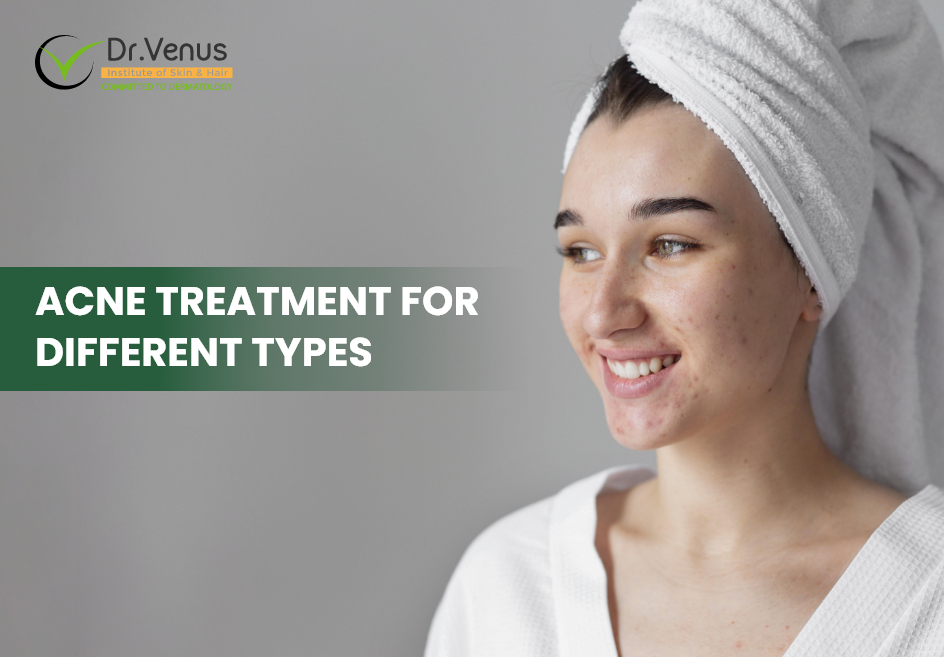Dealing with acne can be tough and frustrating. To achieve clearer skin, it’s crucial to understand the various types of acne you may encounter and customize your acne treatment accordingly. Let us explore different types of blemishes and get valuable insights on how to effectively treat them.
Identifying Different Acne Types: Blemish
Acne manifests in various forms, each requiring a specific approach to acne treatment. Blackheads, whiteheads, papules, pustules, nodules, and cysts – understanding these terms is the first step towards achieving clearer skin.
Blackhead Acne Treatment:
Blackheads, also known as open comedones, develop when hair follicles become clogged with a combination of oxidized sebum and dead skin cells, resulting in their distinctive dark appearance. Commonly used and highly effective, over-the-counter treatments that include salicylic acid, azelaic acid, and benzoyl peroxide prove beneficial. Additionally, retinoids can enhance skin cell turnover, preventing pore blockages.
Whitehead Acne Treatment:
Whiteheads, also known as closed comedones, occur when hair follicles become clogged with oil and dead skin cells, forming a small, raised bump with a white or flesh-coloured top. To treat whiteheads effectively, include following Over the counter acne treatments used for blackheads.
Early Pimples (Papules):
Early pimples, or papules, mark the onset of an acne breakout, characterized by small, red, and solid bumps. While less severe than pustules, they require attention to prevent escalation and potential scarring. Acne Treatment options include oral antibiotics for moderate to severe acne.
Pus-filled Pimples (Pustules):
Pustules, or pus-filled pimples, represent a more advanced stage of acne, characterized by white or yellow-headed blemishes filled with pus. Infected, clogged pores with accumulated bacteria result in visible pus-filled bumps.
For pustular acne treatment, options include sulfur-based products for inflammation reduction, oral antibiotics for moderate to severe cases, and isotretinoin for severe, cystic acne.
Acne Nodules and Cysts:
Acne nodules and cysts represent severe forms of acne, characterized by deep, painful, and often large lesions beneath the skin’s surface. These types of acne demand a comprehensive treatment approach to effectively manage the condition and minimize potential scarring.
Acne treatment options include corticosteroid injections, procedural treatments like laser therapy and chemical peels, surgical procedures for large cysts or nodules, and lifestyle tips for scar prevention and seeking professional help.
Achieving Clearer Skin:
The journey to clearer skin requires patience and perseverance. It’s essential to give acne treatments – typically six to eight weeks. Various acne treatments, including comedo extraction and prescription-strength options, are available for stubborn cases.
OTC acne treatments include
-
- benzoyl peroxide – reduces inflammation, kills bacteria,
- salicylic acid – prevents pore clogging,
- topical retinoids-unclogs pores, promotes skin turnover, and
- topical antibiotics- target bacteria.
Conclusion:
In summary, effective acne treatment starts with understanding the specific type of acne you’re dealing with to develop a targeted skincare routine. Consistent use of gentle cleansing and non-comedogenic products is crucial for managing various types of acne, along with lifestyle adjustments like stress management and dietary changes. If over-the-counter treatments don’t work, consulting a dermatologist is recommended. It’s important to avoid picking or popping pimples to prevent inflammation and scarring. Remember, patience plays a key role in acne treatment, as noticeable improvements may take 6-8 weeks or more.
Get a personalized acne treatment plan tailored to your specific type of acne and meet your skincare goals. Take that first step towards healthier skin by booking your consultation now at Dr.Venus skin and hair clinic.
